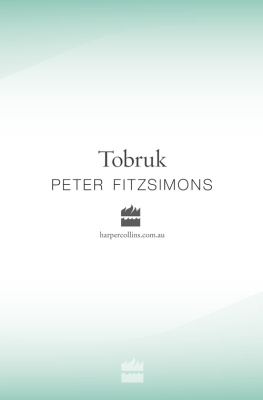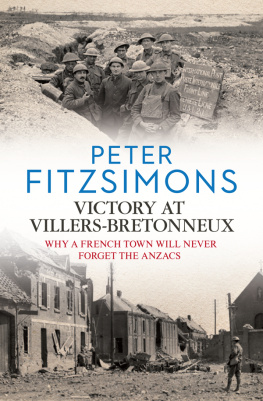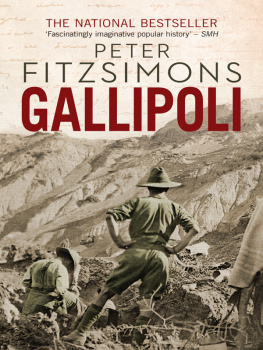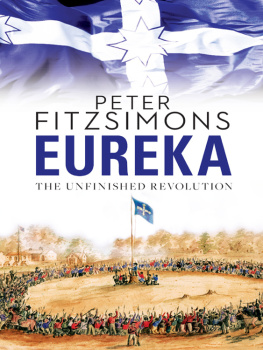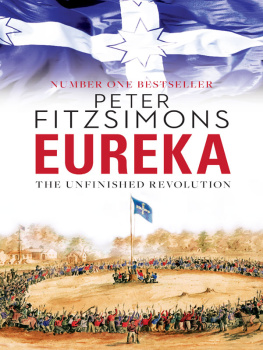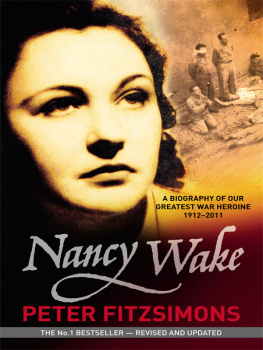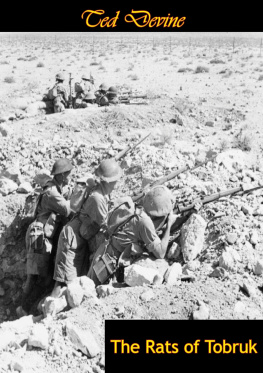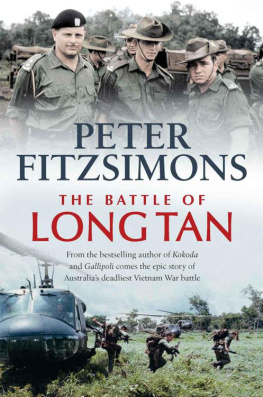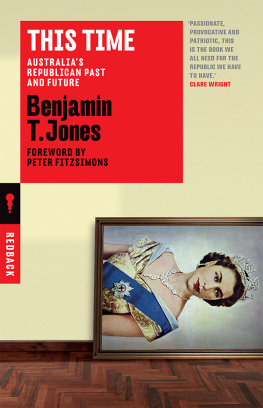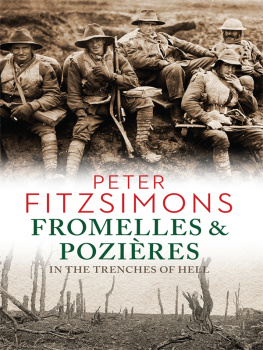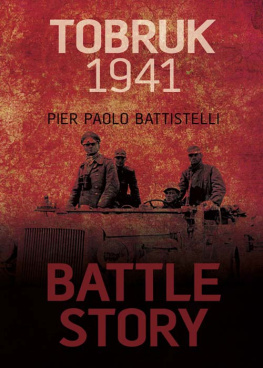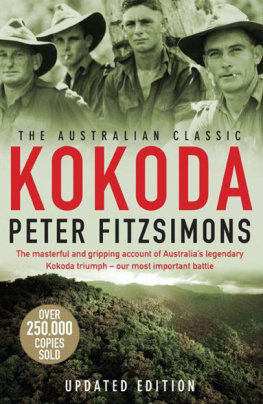To my late parents, Lieutenant Peter McCloy FitzSimons (pictured below, in Cairo, 1941) and Lieutenant Beatrice Helen Booth, OAM, both of whom proudly served with the AIF in World War IImy mother with the 2/7th Australian General Hospital in New Guinea and Bougainville, and my father with the 4th Light Ack-Ack Regiment in North Africa, most notably at the Battle of El Alamein, and then in New Guinea at Finchhaven and Dumpu.
And to you, mighty Rats of Tobruk

The spirit which has made Australia is the spirit which has held Tobruk. The inspiring and binding force in Australian life isnt tradition or nationalism or social revolution. Its quite a simple thing. Henry Lawson called it MATESHIPthe spirit which makes men stick together. In Australia by sticking together, men have defied drought, bushfire and flood. In Tobruk theyve scorned hardship, danger and death, because no Digger would ever let his cobbers down. In Tobruk for the first time in this war the Germans were thrust back by a spirit that even tanks and dive-bombers could not conquer.
Chester Wilmot, quoted in War Cameraman: The Story of Damien Parer
Us Blokes
Only a crowd of civilians
From every walk of life,
We left our homes and our loved ones
For we felt it our duty to fight.
We think of our wives and sweethearts
Back on our sunny shores;
We think of the boys who could help us
Bring victory to our cause.
But we carry on, midst the heat and the dust,
Not that we want to, but we know that we must.
Its square your shoulder and pick up your pack,
For the sooner its over, the sooner were back.
POEM PUBLISHED IN THE 2/48TH BATTALION NEWS SHEET
ON 27 AUGUST 1941, WHILE THE BATTALION WAS IN TOBRUK




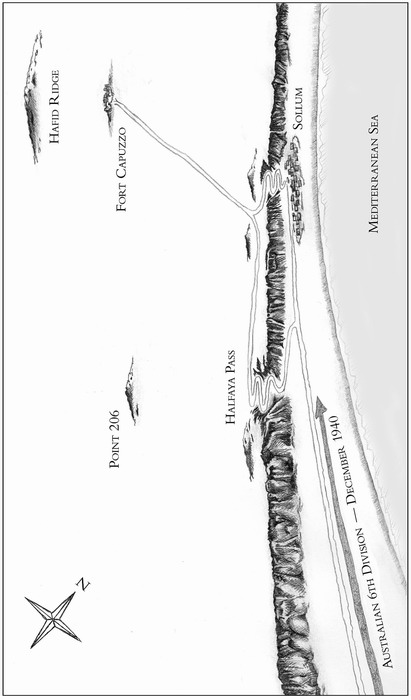
T he title of the book by Mr Peter FitzSimons, Tobruk, refers to the events that lie sixty-five years in the past, the battles between German and Italian soldiers on one side and Australian soldiers on the other side, for the fortress Tobruk in the year 1941. German and Italian troops under the command of my father, General Rommel, had in a Blitzaktion (lightning-speed action) won back the part of Libya that Field Marshal Wavells troops had conqueredwith the exception of Tobruk, a small town with a harbour suitable for deep-water vessels, whose surroundings had been expanded to a half-circle-shaped fortress system by the Italians.
Grown careless, due to his previous successes in France and in Africa, my father suffered a defeat during the attempt to take Tobruk in a coup de main. The Australian defenders withstood, and the Axis forces had to break off their operation.
The fortress remained in the hands of the British 8th Army until it could be taken on 21 June 1942 by the German-Italian troops
Australian troops were at this time not in the fortress. But five months later, in November 1942, Tobruk fell back to the 8th Army without a fight when the German-Italian Panzer army withdrew towards Tunis after Montgomerys victory in the Battle of El Alamein.
The Australian troops, whose fighting value had been well known to the Germans since World War I, played a great part in the British successes in North Africa, be it in Tobruk, also during the battles in autumn and winter 1941 when they, behind the German-Italian front, represented a massive threat; or be it when they contributed in summer 1942 so that the German-Italian march to the Nile delta could be held up; or in the Battle of El Alamein.
Today we are friends. But the graves of our soldiers in the Libyan desert not only remind us of soldierly heroism, but also urge us to do everything to retain peace in the world.
Filled with respect, I take off my hat to the Australian Army and their fallen.
Manfred Rommel
Stuttgart,
March 2006
I t was one of those things, I suppose
Often when I have just finished a book I go into an odd kind of state, bouncing somewhere between exhaustion and exhilaration, swearing on the holy skulls of my ancestors that Ill never put myself through such an arduous process again, and yet knowing on the other hand that I will because it feels so good and satisfying when its done. I was in precisely such a condition in late 2003 when, after having just finished my book Kokoda, I was briefly visiting my aunt and uncle, Ted and Mary Carter, in Napier Street, Tamworth. After sleeping in their spare room, in the first light of dawn the following morning I spied something interesting on the wall, slowly taking shape as more light seeped in.
It was a framed certificate of some kind, featuring the title Rats of Tobruk Association.
Was my Uncle Ted a Rat of Tobruk? I dont even remember him ever talking about it! But then my dad never talked much either about fighting with the 9th Division at the Battle of El Alamein, and my uncle Jim was long dead before I knew hed fought in the last part of the Battle of the Kokoda Track. Mum would mention her service with the AIF in Bougainville and Laehelping rehabilitate injured soldiersif it came up, I suppose, but no more than that. For that generation of Australians just werent big talkersmost especially after the war was over; but in any case, a seed had been planted for my next book.
True, I knew next to nothing about what happened at Tobruk, but in many ways that was the whole point. Why didnt I? Why didnt we all know more of it? How was it that, like Kokodawhich I had also known very little about beforehandmost details of what had happened at Tobruk had so faded from the wider public consciousness that all that was left was the name? Perhaps it was with the twentieth rerun of Patton on Australian television, or perhaps it had been simply the corrosive influence of Coca-Colonisation generally, but somehow a significant chunk of a proud part of our past really had been lost to view. While wed been remembering the Alamo with the Americans, wed forgotten so much of our own stuff, leaving only the legend of Gallipoli intact. And yet Gallipoli consumed all, occupying such space that there was room for little else.
I had been stunned at how inspiring a story Kokoda proved to be, so might Tobruk be the same, I wondered.
A quick chat with Uncle Ted over the bacon and eggswith a liberal sprinkling of the 9th Divisions 2/1st Pioneers, Panzers, minefields, General Erwin Rommel, anti-tank ditches, patrols and something called the Easter Battlebefore heading to the airport, and I was at least resolved to read a bit more about it. No, I didnt want to start another book so soon after finishing Kokoda, but on the other hand, when youre working on something that feels like a great yarn, it doesnt always feel like work.
And so it began. Nudging up to two and a half years later, here we are.
Next page
